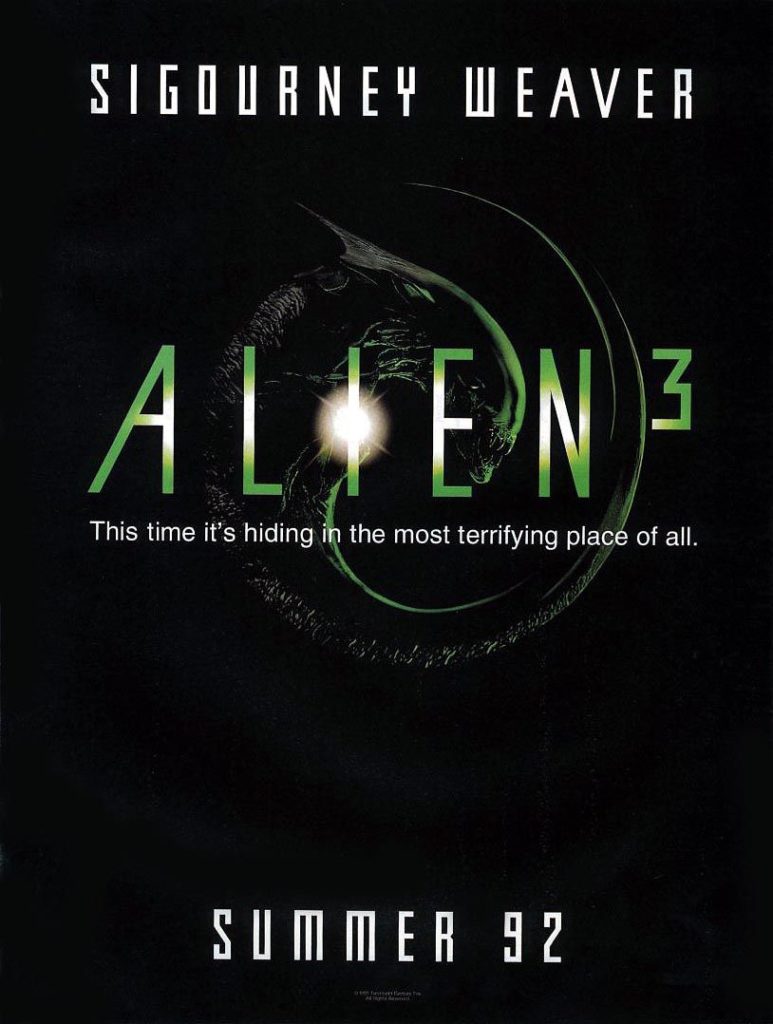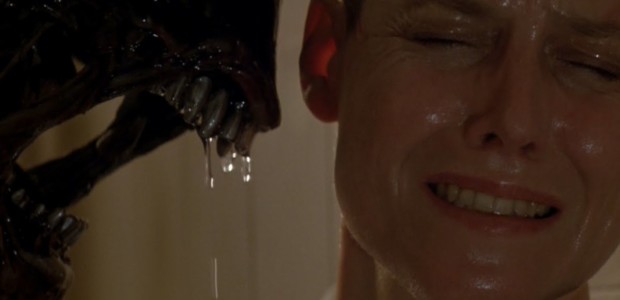In the latest entry in Misbegotten and Forgotten, Nathan Smith takes a look at 1992’s ALIEN³, the third entry in the ALIEN franchise and first theatrical film from David Fincher, released by Twentieth Century Fox.

I know it’s no surprise, but I’m going to get a little personal. My mom’s ex-husband, my stepfather for a quarter of my life died last month. One memory I have of him, it’s one that strikes me often is when he took me, my mom and sister to see ALIEN³. The reason this memory sticks so firmly in my brain, is because of how the film was ruined for me before I even saw the opening credits. This may not make any sense to you, because it was the pre-internet days and at the age of seven, and I sure as shit wasn’t subscribing to Entertainment Weekly. So, let’s paint the picture: It’s Dallas, Texas in 1992. The sky is overcast, and my family is going to the movies. There was a second run movie theatre in Garland called Big Town Cinemas where I saw a ton of movies. JURASSIC PARK and SNOW WHITE AND THE SEVEN DWARFS are two particular titles that I saw. We got to the theatre as the current screening of ALIEN³ was running towards its climax. And my stepfather foolishly bought tickets and didn’t give a damn that we’d missed the previous parts of the film. He marched us all into the theatre, Bishop showed up on Fury 161 and Ripley dove into the molten lava, killing herself and the alien inside of her … and so we all thought, the franchise itself. Naturally, my foolish stepfather also decided that, what the hell, we’d stay for the rest of the movie. That sums up the rest of the relationship with my now-deceased former father figure.
Death, then, is the perfect entryway into talking about why I really love what ALIEN³ does, and how it succeeds in its bleak ambition. The main reason that most film fans have trouble taking in the film, is that most rightfully find the film so overwhelmingly nihilistic you can barely breathe. Those people are right, but this does not make for a bad film.
After Ridley Scott’s nerve-shredding first film, and the bombastic patriotism of James Cameron’s sequel, audiences were fine-tuned to expect a horror-science-fiction action movie mashup where the hero was a kickass female who fought the monster and won the day. But that all changed with the third film. From the opening credits, David Fincher and his writers seem hell bent to fuck up the system and tell the audience that they’re not safe and this film isn’t going to turn out like they want it to. It’s a film that doesn’t play it safe at all. And that’s what works.
ALIEN³ is a quiet, poetic story about how someone copes with the inevitability of death, whether it be someone you’ve loved, cared for, or ultimately yourself. The beginning is Ripley coping with death, so that she may ultimately cope with her own. It’s deliberate that the film is bookended in tragedy, with the unsympathetic way two loved characters are systematically slaughtered without even uttering a syllable and Ripley’s death. It’s even more horrific after having re-watched ALIENS and seeing just how invested James Cameron and his actors get you invested in Hicks’ and Newt’s plight and how he fleshes out Ellen Ripley and creates a timeless character for the ages. It’s no wonder audiences were pissed.
The scene that upset me most was the autopsy scene with Newt. It’s so cold, clinical and detached that it hurts you. I also didn’t remember that the writers sketched the plot of Ripley being impregnated by the Facehugger as something of a surprise. They smartly allude to it a few times, Ripley clearing her throat being one example of foreshadowing, but it’s not something you even find out about until close till the end of act two. I’m curious then for viewers of the film to engage with me to tell me if the magazines and such reported on this kind of thing, or was it a surprise for everyone?
I decided for my rewatch of the film, I’d choose to check out a version of the film I’d never seen before, the Assembly Cut. It was a smart decision. The cut is longer by over forty minutes and feels like a different movie altogether. It’s simple stuff sometimes, like a quiet scene with Charles Dance (a sidebar – I’d seen him in this first, but after seeing him in Game of Thrones for some years, revisiting this much earlier film, I was struck at how much he looked like a young Shea Whigham) looking out over the sea, as if the film’s telling you – quiet time’s over. The shit’s hitting the fan right now. The Alien’s entry method into the film is substantially different too, instead of the horror movie moment of ripping forth from the dog (shades of THE THING, methinks), it’s done subtly and simply with a dead animal and holding up a Facehugger. A few scenes scattered here and there serve as references to ALIEN, one a subversion of the stunning “crew expendable” moment from that feature. My favorite part of the whole thing is how they change the ending. We all know that Ripley dies a glorious slow-mo death at the end of the film, but the heartache and loss at seeing her die is undercut by the cheap shock of seeing the Alien burst forth from her. The Assembly fixes it, by simply not having it happen at all, so that we the audience can grieve for the loss of this amazing action hero and not remember her as a cheap effects punchline.
The prisoners are hit and miss, with most dying before we get a chance to know their names. It essentially works out that the characters we gel easier to are the “nicer” ones of the bad batch. Ultimately the writers, actors and directors have an uphill battle in getting you to ingratiate yourself with violent convicts, albeit ones with religious bents and they mostly succeed, but often it’s just a wall of noise replete with British accents and derogatory slurs. The memorable ones do a better job of standing out, particularly Charles Dutton doing an admirable job of double duty towards Ripley: he gives a shit, but he could also give a damn. It also allows Ripley to have a small relationship with Charles Dance’s character, Clemens, a character I found rather likable and charismatic. He’s by and large our entry point into the film, and his shocking death caught me off guard so much so that I applauded the creatives for taking more risks in the film, than the biggest and obvious one at the end. And of course, this leads to the single most iconic image in the franchise.
My lamentation is that with Ridley Scott taking his (rightful) control on the franchise, we won’t be able to see a director put his own stamp on the films. Even Jeunet’s RESURRECTION had some moments that transcended the wonky material in that fairly good sequel. Bear in mind, despite all the praise I’ve laid on this film’s doorstep, I’d still rank it third – right behind Ridley Scott’s scary first entry, and James Cameron’s big beautiful sequel. It’s just that ALIEN³ is a hell of lot better than you folks remember. At least you’d give it a better shot at it than Fincher would. I can’t claim to know what happened to Fincher or how he truly feels about the film all these years later (I’ve heard he liked the Assembly Cut, but Fincher also seems reticent to talk on a whole lot of topics especially ones that begin with ALIEN and end with ALIEN³), but after viewing the films he’s made in his career, he should be proud of ALIEN³. It’s a distinct mark at the start of a distinct and lush career. It’s time to revisit it. It’s time to learn to love it.
After ALIEN³, David Fincher would move onto what is arguably the film that truly set him on the map of filmgoers, -makers, and critics everywhere with the nihilistic SEVEN (a film that moved forth with the dark template he set with his debut). And from there, he became a genre chameleon, pivoting between films like THE GAME, FIGHT CLUB, PANIC ROOM and (my personal favorite), ZODIAC establishing a film footprint that others have tried and failed to emulate. It’s a little interesting to see him signed up for a sequel to another established film, WORLD WAR Z 2, but perhaps that choice tells us that he’s comfortable with sequels again. Walter Hill, whose credits are undisputed classics, went on to plug on with projects that were still very much in his wheelhouse like LAST MAN STANDING, directing the Deadwood pilot and as close as last year, releasing the film, THE ASSIGNMENT. He’s also still very much involved in the ALIEN franchise, having produced the last two Ridley Scott directed entries and sharing the namesake of Michael Fassbender’s android. David Giler worked closely prior to and onward with Walter Hill, together they executive produced Tales from the Crypt and as mentioned earlier, continue to produce the ALIEN franchise. Sigourney Weaver continues to excel at her craft, becoming an excellent genre stateswoman in film like THE CABIN IN THE WOODS amongst many other films. Her continued love of the franchise that brought us to her doorstep, proves that verily she is a goddess among us all.
Tags: Alex Thomson, alien, Brian Glover, Charles Dance, Charles S. Dutton, Dan O'Bannon, Danny Webb, David Crowther, David Fincher, David Giler, Elliot Goldenthal, Holt McCallany, James Cameron, Jr., Lance Henriksen, Larry Ferguson, Michael Biehn, Paul McGann, Pete Postlethwaite, Ralph Brown, Ridley Scott, Ronald Shusett, sigourney weaver, Terry Rawlings, Tom Woodruff, Twentieth Century Fox, Vincent Ward, walter hill


No Comments